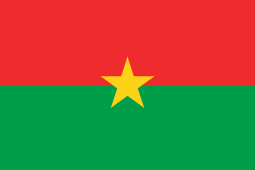Energy in Burkina Faso
Energy in Burkina Faso is a growing industry with tremendous potential.
Burkina Faso produced 69 kilotonne of oil equivalent (ktoe) of energy in 2015, 89.8% of which was generated from fossil fuels.[1] Final consumption of electricity was 86 ktoe.[1] The country uses energy from biomass, fossil fuels, hydroelectricity, and solar.[1]
As of 2014, Burkina Faso's total greenhouse gas emissions was at 32.60 million metric tons of carbon dioxide equivalent (MtCO₂e).[2] The country has committed to reduce its emissions by at least 7.8 MtCO2e (or 6.6%) by 2030.[2]
To help achieve this, the country targets 100% of its electricity generation to come from renewable sources by 2050.[3]
Electricity
Electricity accounts for all energy production. Total installed electrical capacity in 2001 was 121 megawatts (MW). Production rose from 42 gigawatt-hours (GWh) in 1973 to 280 GWh in 2001, of which 73.6% was thermal and 26.4% hydroelectric. Consumption of electricity was 0.26 billion kilowatt-hours in 2001. Construction of a 15 MW hydroelectric facility at Kompienga was finished in 1989. In 1999, with a grant from the government of Denmark, Burkina Faso built a new power station, completing it in just five months to meet the country's emergency energy needs. Production and distribution of electricity and water are controlled by the state-owned Société Nationale d'électricité du Burkina Faso (SONABEL), established in Ouagadougou in 1968.
As of 2008, it is estimated 7% of Burkina Faso have access to electricity.[4] In 2017, French president Emmanuel Macron inaugurated a 33 MW solar plant, that will produce electricity for 110,000 households.[5]
| Type | installed power (2019,(MW)) |
|---|---|
| Diesel and heavy fuel oil | 253 |
| Hydropower | 32 |
| Solar | 33 |
| Total | 318 |
Oil and gas
All petroleum products are imported since the country has no known crude oil reserves or refining capacity As of 2003. Imports and consumption of petroleum in 2002 amounted to 8,870 barrels per day. As for natural gas, Burkina Faso is known to have no natural gas production, consumption, or reserves.
Renewable energy
West Africa's biggest solar plant began operation in Burkina Faso on November 29, 2017.[7]
References
- "Energy Profile: Burkina Faso" (PDF). 2015.
- "Greenhouse Gas Emissions in the West Africa Region" (PDF). April 2019.
- "Renewables 2019: Global Status Report" (PDF). 2019.
- Access to Electricity 1993-2017
- "Burkina Faso launches Sahel region's largest solar power plant". Euractiv. 2017-11-28. Retrieved 2020-05-15.
